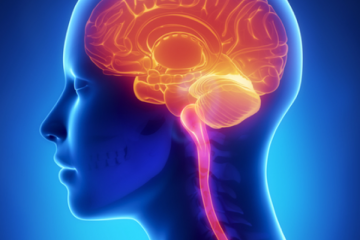How To Get Rid of Brain Fog: My 5 Top Tips

If you feel like you have difficulty concentrating, remembering things, or feel like your brain just isn’t working properly, then this is for you.
Brain fog is an unrecognised and under appreciated issue, effecting people’s ability to work, socialise and enjoy life.
In this article, I’ll talk a bit about what brain fog is and share my top 5 tips on how to get rid of brain fog.
What is brain fog?
Brain fog, or functional cognitive disorder (FCD), is a ‘subjective experience of cognitive dysfunction’ that cannot be identified using blood tests or scans.
It’s often the case, when you see your GP or describe the symptoms to a friend, you may not be taken seriously and told that ‘you seem normal’ and ‘it’s all in your head’, but you know things are not right.
The good news is, brain fog or FCD was recently added to the diagnostic manual for neurologists in the UK, so you are not alone. There is currently no medical treatment available at this time.
Typical symptoms of brain fog include:
- Difficulty focussing or concentrating.
- Difficulty reading and recalling information.
- Difficulty following a conversation or remembering it’s content.
- Difficulty with speech fluency.
- Disorganised thoughts.
- Absent-mindedness.
- A feeling of fogginess or that your mind is behind a wall.
- A feeling of increased effort to complete tasks.
Bear in mind, that many of these symptoms can overlap with many neurological diseases including dementias, sleep apnoeas, functional neurological disorders, post-concussion syndrome, whiplash syndrome, anxiety and depression. So, please see your GP/internist if you are concerned.
Some good news
Brain fog has been recognised for a very long time in the nutrition and functional medicine community.
It is an increasingly common problem in my practice, especially amongst students and busy professionals.
So what can cause brain fog?
There are several theories all of which are often effects of an underlying cause:
- Chronic physical/emotional stress leading to increased cortisol and adrenaline levels (HPA-axis dysfunction).
- Increased inflammation in the brain as a result of oxidative stress.
- Dysbiosis leading to excessive ammonia production in the gut.
- Increased interoceptive monitoring (being ‘in our heads’ all the time, hyper-focussing on our symptoms, which exhausts our ability to focus).
- Nutrient deficiencies/insufficiencies including B1, B3, B5, B6, B9, B12, zinc, calcium and magnesium.
Underlying causes can include:
- Poor sleep
- Poor diet
- Fatigue and energy-related conditions including chronic fatigue syndrome and fibromyalgia.
- Adrenal fatigue (HPA-axis dysfunction)
- Digestive issues including bloating, constipation and IBS
- Thyroid conditions
- PCOS
- Overtraining
- Allergies and Hayfever
- Food intolerances and sensitivities
- Postural tachycardia syndrome (POTS)
- Autoimmune conditions
- Chronic infections
- Heavy metal toxicity
So what can we do about it? Here are my five top tips to get rid of Brain fog:
- Relax and get out of your head!
Brain fog is one of the most annoying and frustrating conditions. I’ve seen it turn normally extroverted people into introverted hermits. So telling you to relax is probably not what you want to hear but hear me out.
One mechanism proposed by researchers is that people with brain fog/FCD, may excessively over-monitor themselves. We all do it, especially when we are unwell.
But increased ‘interoceptive monitoring’ over the long-term may reduce the brain’s attentional reserves, slowing our ability to process information, ultimately, reducing our ‘brain power’.
In other words, stressing about it, can make things worse.
If you don’t know what I mean, here is what increased ‘interoceptive monitoring’ looks like in practice?
We may continuously test and monitor our abilities against what they used to be. You may ask yourself ‘Can I remember what I had for dinner on Tuesday or what was the name of the presenter on the news last night?’
You then start comparing yourself to the way you used to be. You may then beat yourself up, perpetuating more negative thoughts and driving the cycle.
I’ve found using a combination of mindfulness meditation, cognitive behavioural therapy or the Gupta programme to be greatly beneficial.
Even just spending time with friends can help get us out of our heads!
Try to remember, that although relaxing won’t fix it completely. By chilling out and focussing on ‘what’s out there’ as opposed to what’s in our minds, we can help the thoughts to flow a little easier.
2. Address the root cause
I see people using supplements, caffeine and even drugs to improve their cognitive performance. But these are all short-term fixes.
If you want lasting and abundant energy and cognition, the most effective way to get there is to identify and address the underlying causes (as mentioned above).
Remember: we need a strong body for strong cognition.
3. Stabilise your energy
Our brains ability to function, relies heavily on a steady supply of energy. Often, just introducing protein with each meal, can make a massive difference to stabilising your blood sugar and reducing that mid-afternoon lull.
Eating breakfast first thing and eating at least three main meals can help your energy too.
4. Increase your intake of nutrient dense foods
Introducing green leafy vegetables and animal proteins can give you a boost of the vitamins, minerals and phytonutrients your body needs to reduce inflammation and support abundant energy.
Try to aim for 6-8 portions of vegetable per day such as broccoli, cauliflower, brussel sprouts, cabbage, parsnips, swedes, carrots and sweet potatos.
I’ve found removing nightshade vegetables to be extremely beneficial as it is believed vegetables including potatoes, tomatoes and aubergines, can trigger inflammatory processes affecting the brain.
Interestingly, Dr Terry Wahls excludes nightshades in her programme for MS.
Although, the research is extremely limited, I’ve often seen alleviation of cognitive symptoms when nightshades are removed. It may of course be the improved nutrition, stress management and sleep too!
5. Sleep
It is well known the effects of tiredness have been compared to the effects of alcohol while driving.
Lab studies have shown if you deprive animals of sleep for as little as two weeks they die (less time than it takes to die of starvation).
My point is, if you want to improve your brain fog, sleep is crucial.
Try improving your sleep by using blue light blocking glasses one to two hours before bed. Removing digital devices including TV’s from the bedroom can a make a big difference too!
I also highly recommend checking out Sleepio: the online sleep improvement programme, a five week evidence based programme devised by sleep scientists.
Some Food For Thought
I am passionate about helping people achieve their potential through improved cognitive function.
I believe at a subtle level, the majority of people struggle with some degree of cognitive imbalance.
Do you feel like your brain is working at its best?
Do you feel like you function with clarity and acuity?
Can you face big challenges without feeling overwhelmed or stressed?
Is self-harm a symptom?
I’ve always been fascinated by the numerous medical conditions, where self-harm was a symptom.
For example, Smith-Lemli-Opits syndrome, a congenital condition, affects cholesterol metabolism causing brain damage.
Many of these children (like many with learning disabilities) self-harm or self-injure.
At a very subtle level, isn’t that what we do when we make poor decisions despite our ‘best’ efforts?
We procrastinate, run late, say the wrong thing, lose our temper and don’t deliver what we know we can.
Yet, we know, these things are not in our best interests and don’t live up to our potential.
Why can some people stay cool and achieve, while many, unable to cope and submit to a life of self-deprecation and failure?
There are of course, multiple bio-psycho-social factors, but I believe at the core, is a healthy brain allowing us to make the right decisions.
I believe the brain’s imperative is to survive and thrive. Positive, proactive behaviours should be effortless and automatic.
A healthy balanced brain is able to make the right decisions and take the correct action with ease.
An unbalanced brain leads to failure and disappointment. A healthy balanced brain leads us to a productive and happy life.
Getting rid of brain fog can allow us to enjoy life, whilst being busy and productive people.
Wishing you well on your path to health,
Inder


0 Comments